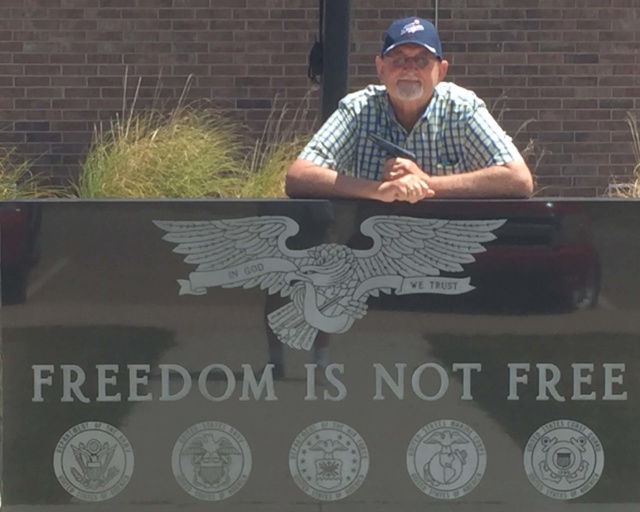
As a Vietnam veteran, my dad is a lot of things, but he is most definitely not a quitter. When he wants something accomplished, he keeps trying to get it done until he is able to make it happen. It’s an admirable quality.
What has made this intriguing to me of late is when he said he had scheduled an appointment to talk to a physician about getting some hearing aids. Knowing that he had been seeking supplementary financial assistance from the Veterans Administration (VA) for the hearing aids, I didn’t get the feeling this was supposed to be the next step in that process.
Now, I wasn’t intrigued that he was having to seek the use of a hearing aid. There is no doubt his hearing isn’t what it used to be.
What surprised me was that he had been following every request made of him by the VA after he’d requested assistance with costs related to his hearing loss. Having been in the U.S. Army, my dad spent more than his share of time around mortar shells and explosions. To put it mildly, he wasn’t hiding from the action.
Plausible deniability
Unfortunately, my dad’s request for assistance has been denied, even though he can prove he has hearing loss. The VA rejected it because he couldn’t prove his time serving his country — while repeatedly exposing his auditory system to mortar and gunshot blasts — was the exact cause of his current hearing problems.
Instead, the agency insisted it knew that my dad’s exposure to machinery at a tire-producing plant was the cause of his problems.

Who knows for sure? Is it possible that he suffered zero hearing loss while in the U.S. Army and instead experienced all of the damage during his time at work? I’m not a doctor, but that doesn’t seem likely. At the very least, the exposure to the mortar shelling in the military had to have at least eroded his auditory system enough to make it easier to lose his hearing further during his years working around tire-making machines.
What gets me more than anything, however, is not that the VA is fighting my dad on this particular issue. They likely get tons of requests similar to this one, and we have all read about how little money the VA has to help those it is tasked with serving.
What annoys me is that we as a nation are spending millions of dollars to avoid spending millions of dollars to help our veterans. These are the men and women who, in most cases, signed up to serve knowing they might sacrifice their lives for our country.
All these years later, my dad filed a basic request for assistance that some had told him would be a rubber stamp. Others had said it would be rejected for no good reason. Unfortunately, the latter was the reality in this case.
Failures of the VA widespread and known
At this point, I’m sure I sound like an overly concerned son, but I also know this is something my dad has taken as just another example of poor treatment since he returned from Vietnam. It wasn’t as if our troops in Vietnam were given the same level of respect so many of our military members received when returning from World War II.
But there seems to be a significant difference in how our soldiers are viewed after they return from active duty and take off the uniform. It is as if the uniform itself has some magical power that garners respect and admiration. Take off the uniform, and you are just another person. Or, as has been the case for many of our veterans, you are treated as less than the average person.
With almost 22 million veterans, the VA has a large pool of former soldiers who could potentially be in need of services. Data from a 2000 study — before wars in Iraq and Afghanistan — show a whopping 87 percent of veterans don’t use the VA for their medical care. Contrast this to now, as the federal agency requested more than $170 billion for the 2017 fiscal year, which would include $66.4 billion in discretionary funds for medical care. And while $170 billion sounds like a huge number, it pales in comparison to the nearly $600 billion we spend on our defense overall.
Just how many soldiers returned and found a lack of help to rebuild the lives they needed? We often forget or just completely ignore the relationships military members leave behind as they serve multiple tours overseas. We fail to pay attention to the mental and physical anguish they deal with on a daily basis owing to the atrocities they are exposed to while serving their country.
It was estimated in 2014 that America has nearly 50,000 homeless veterans, a number that was a significant decrease from 2009. The numbers showing mental illness problems among active-duty soldiers are disturbing, and rising suicide rates are a deadly part of the problem.
For those whom the VA does serve, the results have been underwhelming. Whether it was at Walter Reed Army Medical Center or right here in Oklahoma, our veterans deserve better than what they have received.
Apply honor and respect to ALL veterans
Sure, we all think we are doing our part when we tell a man in uniform, “Bless you for your service,” as we pass him during our daily routine. At the same time, we often pass a homeless veteran without a word while staring straight ahead. Or, we lump them into a category of “lazy welfare recipients” because they were unable to maintain a job while dealing with the after-effects of killing people or watching their friends die around them. It’s not an easy life.
Whether it is the votes we cast for politicians whose support for veterans is consistently underwhelming or the way we personally treat those out-of-uniform veterans in everyday situations, we as a nation need to step it up. Our veterans deserve to be respected in and out of the uniform.
I personally never fought as a soldier, nor am I looking forward to ever having to take up arms in any situation that would require me to take a life, whether in defense or as part of an act of aggression. Having not been in that position, however, does not make me feel any less respect for our men and women in the armed forces. I only wish I were surrounded by people whose actions reflected the same attitude.
Our soldiers and veterans deserve better. My dad deserves better.





















